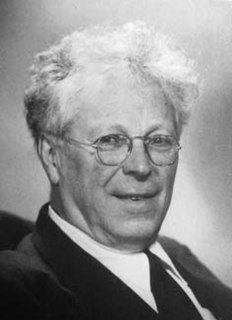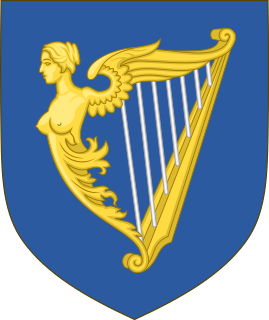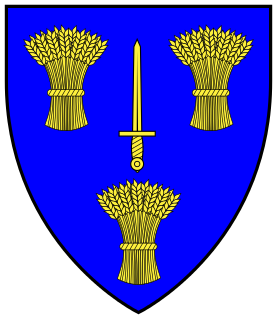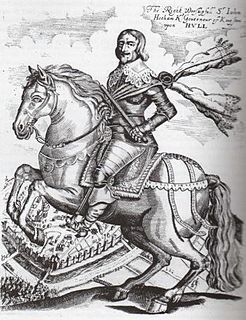This article does not cite any sources .(April 2015) (Learn how and when to remove this template message) |
This article does not cite any sources .(April 2015) (Learn how and when to remove this template message) |

Abram Samoilovitch Besicovitch was a Russian mathematician, who worked mainly in England. He was born in Berdyansk on the Sea of Azov to a Karaite family.
Samuel Sugden, FRS was an eminent chemist in the first half of the 20th century.
William Taylor was a British inventor noted for his many inventions for improvement of photographic lenses. Taylor was president of Institution of Mechanical Engineers, and a Fellow of the Royal Society.

Sir William Wallace was a Scottish knight who became one of the main leaders during the First War of Scottish Independence.

The Irish House of Commons was the lower house of the Parliament of Ireland that existed from 1297 until 1800. The upper house was the House of Lords. The membership of the House of Commons was directly elected, but on a highly restrictive franchise, similar to the Unreformed House of Commons in contemporary England and Great Britain. In counties, forty-shilling freeholders were enfranchised whilst in most boroughs it was either only the members of self-electing corporations or a highly-restricted body of freemen that were able to vote for the borough's representatives. Most notably, Catholics were disqualified from sitting in the Irish parliament from 1691, even though they comprised the vast majority of the Irish population. From 1728 until 1793 they were also disfranchised. Most of the population of all religions had no vote. The vast majority of parliamentary boroughs were pocket boroughs, the private property of an aristocratic patron. When these boroughs were disfranchised under the Act of Union, the patron was awarded £15,000 compensation for each.
The office of Lord High Chancellor of Ireland was the highest judicial office in Ireland until the establishment of the Irish Free State in 1922. From 1721 to 1801, it was also the highest political office of the Irish Parliament: the Chancellor was Speaker of the Irish House of Lords. The Lord Chancellor was also Lord Keeper of the Great Seal of Ireland. In all three respects, the office mirrored the Lord High Chancellor of Great Britain.

The Royal Society of Edinburgh is Scotland's national academy of science and letters. It is a registered charity, operating on a wholly independent and non-party-political basis and providing public benefit throughout Scotland. It was established in 1783. As of 2017, it has more than 1,660 Fellows.

Her Majesty's Solicitor General for England and Wales, known informally as the Solicitor General, is one of the Law Officers of the Crown, and the deputy of the Attorney General, whose duty is to advise the Crown and Cabinet on the law. He or she can exercise the powers of the Attorney General in the Attorney General's absence.
The Comptroller of the Household is an ancient position in the British royal household, nominally the second-ranking member of the Lord Steward's department after the Treasurer of the Household. The Comptroller was an ex officio member of the Board of Green Cloth, until that body was abolished in the reform of the local government licensing in 2004. In recent times, a senior government whip has invariably occupied the office. On state occasions the Comptroller carries a white staff of office, as often seen in portraits.
The Chemical Society was formed in 1841 by 77 scientists as a result of increased interest in scientific matters. Chemist Robert Warington was the driving force behind its creation.

This is a list of Sheriffs of Cheshire.

The Sheriff is the oldest secular office under the Crown. Formerly the Sheriff was the principal law enforcement officer in the county but over the centuries most of the responsibilities associated with the post have been transferred elsewhere or are now defunct, so that its functions are now largely ceremonial.
The High Sheriff of Devon is the Queen's representative for the County of Devon, a territory known as his/her bailiwick. Selected from three nominated people, they hold his office over the duration of a year. They have judicial, ceremonial and administrative functions and executes High Court Writs. The office historically was "Sheriff of Devon", changed in 1974 to "High Sheriff of Devon".
This is a list of High Sheriffs of Lincolnshire.

The High Sheriff of Lancashire is an ancient officer, now largely ceremonial, granted to Lancashire, a county in North West England. High Shrievalties are the oldest secular titles under the Crown, in England and Wales. The High Sheriff of Lancashire is the representative of the monarch in the county, and is the "Keeper of The Queen's Peace" in the county, executing judgements of the High Court through an Under Sheriff.
This is a list of the Sheriffs and High Sheriffs of Staffordshire.

In the Kingdom of England, the title of Secretary of State came into being near the end of the reign of Queen Elizabeth I (1558–1603), the usual title before that having been King's Clerk, King's Secretary, or Principal Secretary.

The 1922 Dissolution Honours List was issued on 19 October 1922 at the advice of the outgoing Prime Minister, David Lloyd George.
The 1861 Birthday Honours were appointments by Queen Victoria to various orders and honours to reward and highlight good works by citizens of the British Empire. The appointments were made to celebrate the official birthday of the Queen, and were published in The London Gazette on 28 June 1861.